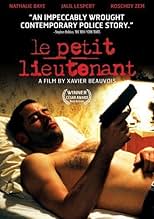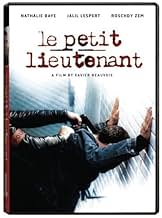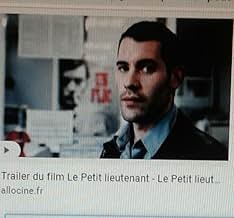VALUTAZIONE IMDb
6,9/10
2691
LA TUA VALUTAZIONE
Aggiungi una trama nella tua linguaA rookie policeman from provincial Le Havre volunteers for the high pressure Parisian homicide bureau and is assigned to a middle-aged woman detective.A rookie policeman from provincial Le Havre volunteers for the high pressure Parisian homicide bureau and is assigned to a middle-aged woman detective.A rookie policeman from provincial Le Havre volunteers for the high pressure Parisian homicide bureau and is assigned to a middle-aged woman detective.
- Regia
- Sceneggiatura
- Star
- Premi
- 5 vittorie e 8 candidature totali
Yaniss Lespert
- Alex Derouère, le frère d'Antoine
- (as Yanis Lespert)
Recensioni in evidenza
Extremely realistic. So much so that it's almost miserable to watch. We see a young and inexperienced police detective adjust to the aspects of his new job - from working through a pistol stoppage on the range, to knocking on doors looking for information about a murder, interviewing people who barely speak his language and trying to integrate with his new coworkers. We also see an experienced police veteran working through the problems that prolonged living in a stressful environment have produced as she returns to work after a two-year sabbatical. She takes the young Antoine with her throughout the course of a murder investigation, and the illustration of the dichotomy between them is nearly perfect. Avoided are the cliché kicking down of doors, Miami Vice / Hawaii 5-0-style firefights, Joe Friday detectives and "arch villains" that typically plague police films. The overall feeling that I had throughout the movie was monotony and despair as I identified with Antoine's feelings of separation, anxiety and of being overwhelmed. We see equally Commandant Vaudieu's sobriety struggle in scenes where her section is gathering at a bar after work for drinks while she orders a glass of mineral water. It's not a happy movie, it's not even entertaining, but it is realistic, extremely well played, and it is a moving, gritty drama that does for PJs what La Chambre des Officiers did for soldiers. It humanises them.
As in previous Beauvois' movies, this film is about loss. The loss is everywhere in the movie : the loss of the dead child of the main female character, the loss of a normal couple life for the "petit lieutenant" and, finally, his loss. What makes the movie so interesting is the way in which it uses the form of the cope movie (film noir) as a way to reflect the hardships of living with the memory of the dead, to go on while things are forever changed by their disappearance. At the same time, the form of the cope movie is more than a mere pretext: the director is very much at ease with the conventions of the genre and is very skillful at going beyond by adding stunning realistic elements. There is no heroism there, only gloom and despair. No big man hunt, but a very trivial one. A very good movie. A must see for lovers of french film noir.
Le Petit Lieutenant makes Eastern Promises look like the mediocre knock off it is. "Eastern..." has nothing substantial to offer beyond a couple of signature scenes and is ultimately forgettable after the echo of its posturing and violence subside (can't really understand why the critics adore Cronenberg so much), and it is no more evident than when I compare his film to another that works so much better, like Le Petit Lieutenant (an 8 1/2 out of 10)
Both are dramas that operate fully within the "crime genre," but whereas there is very little that is original or compelling beyond the dramatic pretense of Eastern Promises, the French film is rich with characterizations and direction that lend depth to its realistic story. Whereas "Eastern..." creates slick, hip Hollywood scenes that tease and gratify our primal senses without really engaging any of its real dilemmas, "Petit..." draws us in (via a casual documentary like style) to the life of a young detective just out of cadet school who is becoming familiar with his co-workers and line of work on the streets of Paris. It is through him and his interactions with everything around him that we begin to experience something more dramatic, almost without realizing it, until the tragedy of common (rather than postured) occurrence invades our psyche, and plays out amidst a suspense created by the tension of anxiety, anguish, and inner strength of his chief inspector (a woman), portrayed with great humanity by Nathalie Baye.
Like all Hollywood movies, Eastern Promises offers the semblance of real drama at the beginning, only to abandon its stories and characters as it lapses into the improbability and titillation we have all grown accustomed to at the cinema. The french film, on the other hand, demonstrates its concern for the people it has given life to by engaging our own humanity rather than our anticipation of the next thrill that lies around the corner....
your cinewest correspondent
Both are dramas that operate fully within the "crime genre," but whereas there is very little that is original or compelling beyond the dramatic pretense of Eastern Promises, the French film is rich with characterizations and direction that lend depth to its realistic story. Whereas "Eastern..." creates slick, hip Hollywood scenes that tease and gratify our primal senses without really engaging any of its real dilemmas, "Petit..." draws us in (via a casual documentary like style) to the life of a young detective just out of cadet school who is becoming familiar with his co-workers and line of work on the streets of Paris. It is through him and his interactions with everything around him that we begin to experience something more dramatic, almost without realizing it, until the tragedy of common (rather than postured) occurrence invades our psyche, and plays out amidst a suspense created by the tension of anxiety, anguish, and inner strength of his chief inspector (a woman), portrayed with great humanity by Nathalie Baye.
Like all Hollywood movies, Eastern Promises offers the semblance of real drama at the beginning, only to abandon its stories and characters as it lapses into the improbability and titillation we have all grown accustomed to at the cinema. The french film, on the other hand, demonstrates its concern for the people it has given life to by engaging our own humanity rather than our anticipation of the next thrill that lies around the corner....
your cinewest correspondent
I saw the movie being a French police officer.
Usually I don't like movies about French police for they are mostly very unrealistic.
There however we have a story about what could be a regular case in one of the most important Crime Units in the city of Paris. With regular police work done by regular police detectives.
The actors are playing in a such realistic manner that they just could be real cops caught in their everyday work.
The movie is sad, very sad and hard. I don't think you would apply to become a police officer after seeing it ...
Usually I don't like movies about French police for they are mostly very unrealistic.
There however we have a story about what could be a regular case in one of the most important Crime Units in the city of Paris. With regular police work done by regular police detectives.
The actors are playing in a such realistic manner that they just could be real cops caught in their everyday work.
The movie is sad, very sad and hard. I don't think you would apply to become a police officer after seeing it ...
A young lieutenant, fresh from school, starts in Paris in a homicide squad. He grew up in Le Havre, where his wife still teaches at school. He misses her and tries to get her to move to Paris too. His boss is a very good police inspector, who just returns to the police after having dropped for personal reasons. She had lost her only son and became an alcoholic. Now she is clean and takes over a new group. Soon they have to investigate the murder of a homeless person. The search for the killer brings big dangers for most of the group, but specially for the lieutenant and his boss.
The film shows some everyday routine of police work and how the officers enjoy themselves after their day is done. There are no big things going on, even the murder case is not very special. It is the personal situation of the two main characters that involves the interest of the audience. Well done, though not really great. 7 out of 10.
The film shows some everyday routine of police work and how the officers enjoy themselves after their day is done. There are no big things going on, even the murder case is not very special. It is the personal situation of the two main characters that involves the interest of the audience. Well done, though not really great. 7 out of 10.
Lo sapevi?
- QuizXavier Beauvois, the director, decided finally not to use background music for this movie. It gives a special atmosphere to the movie.
- BlooperReflected in window as Vaudieu and Solo exit the church.
- Citazioni
Mireille, la logeuse: [after Antoine introduces himself as Lieutenant Derouère] These days, it's "Lieutenant" and "Captain." It's too much like the Army. Not that I don't like the Army, but "Monsieur l'Inspecteur"... It makes me think of Maigret...
- ConnessioniReferenced in Le Mozart des pickpockets (2006)
I più visti
Accedi per valutare e creare un elenco di titoli salvati per ottenere consigli personalizzati
Dettagli
- Data di uscita
- Paese di origine
- Sito ufficiale
- Lingue
- Celebre anche come
- The Young Lieutenant
- Luoghi delle riprese
- 118 Rue des Pyrénées, Paris 20, Parigi, Francia(shelter where Antoine gets stabbed)
- Aziende produttrici
- Vedi altri crediti dell’azienda su IMDbPro
Botteghino
- Lordo Stati Uniti e Canada
- 216.724 USD
- Fine settimana di apertura Stati Uniti e Canada
- 16.871 USD
- 10 set 2006
- Lordo in tutto il mondo
- 3.984.265 USD
- Tempo di esecuzione
- 1h 50min(110 min)
- Colore
- Mix di suoni
- Proporzioni
- 1.85 : 1
Contribuisci a questa pagina
Suggerisci una modifica o aggiungi i contenuti mancanti

![Guarda Bande-annonce [OV]](https://m.media-amazon.com/images/M/MV5BZTQ1NDYxZTYtMGRjZC00YTkwLTkxZTktODMzNjk1NjU0MWExXkEyXkFqcGdeQXRyYW5zY29kZS13b3JrZmxvdw@@._V1_QL75_UX500_CR0)




























